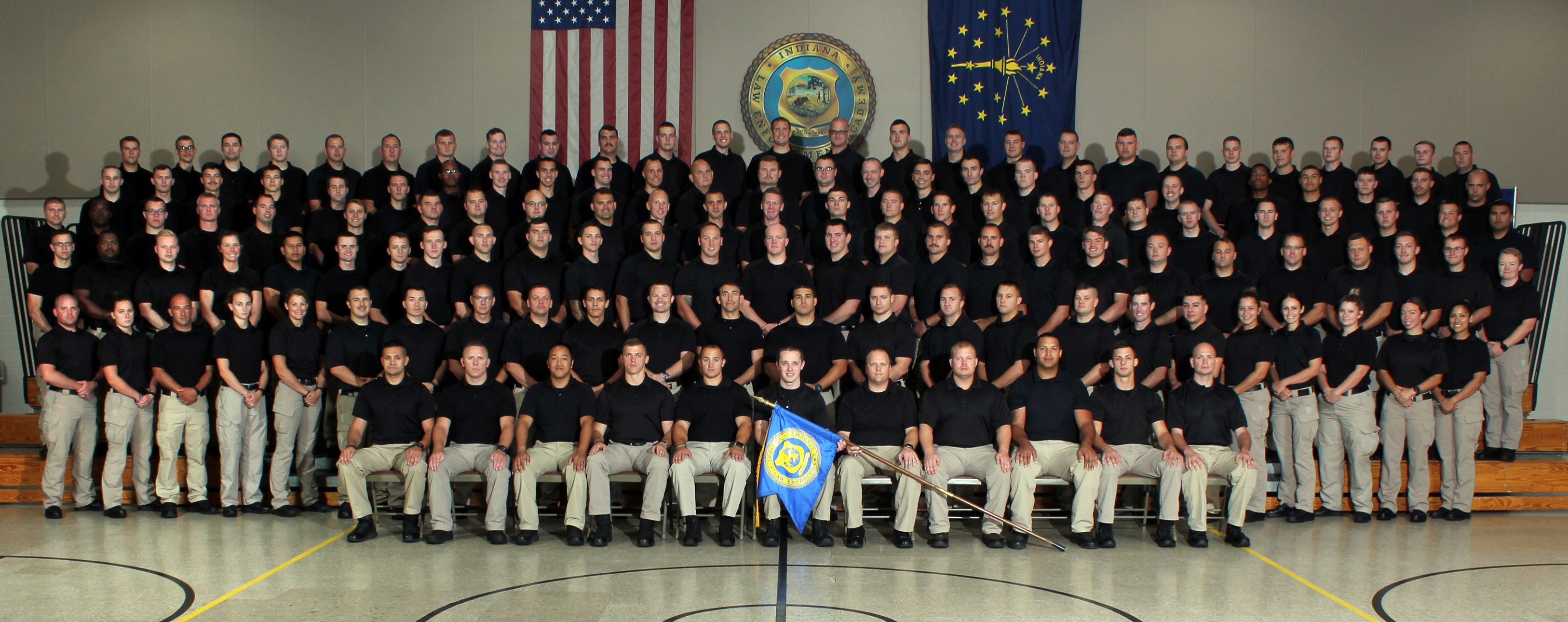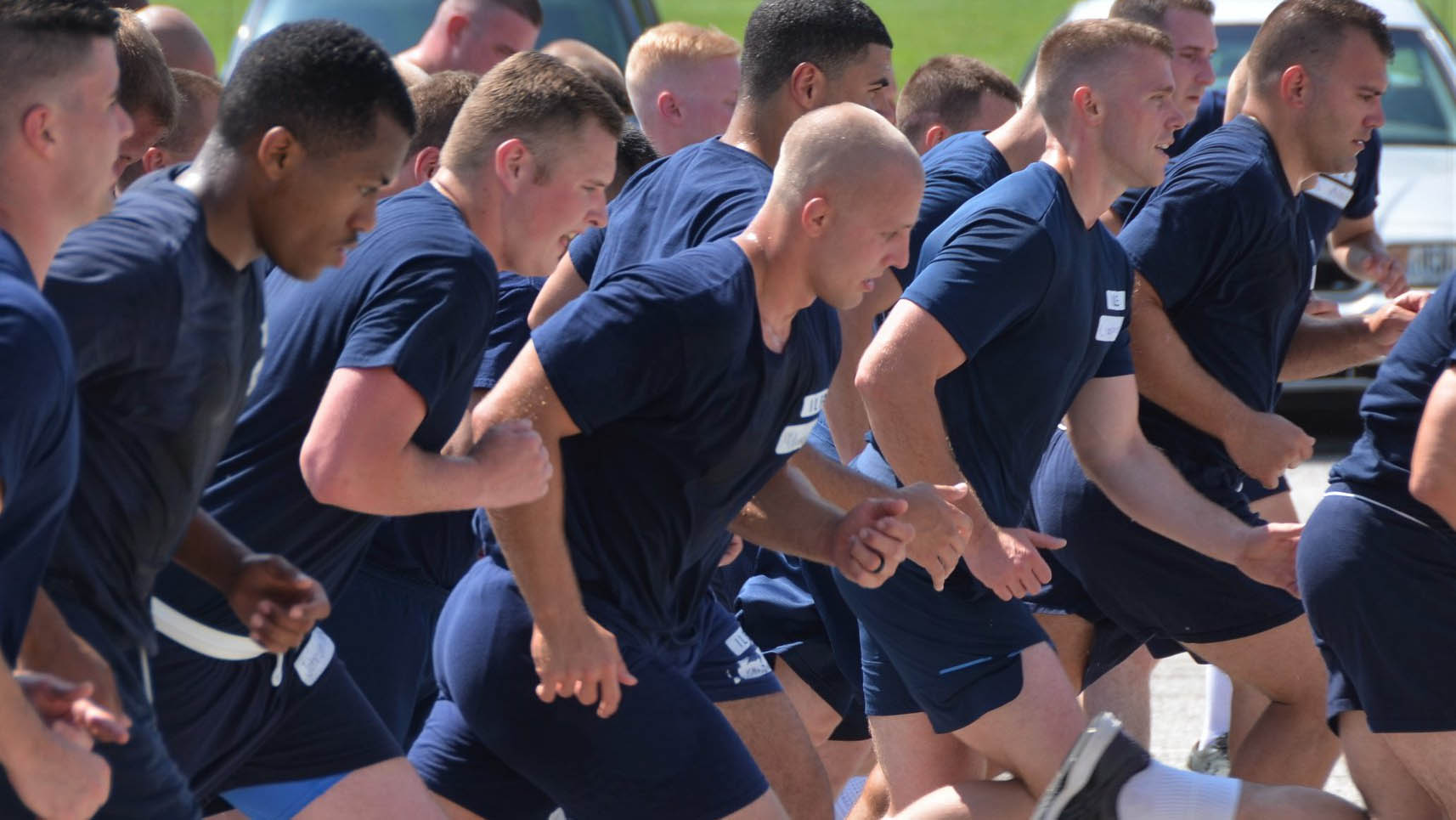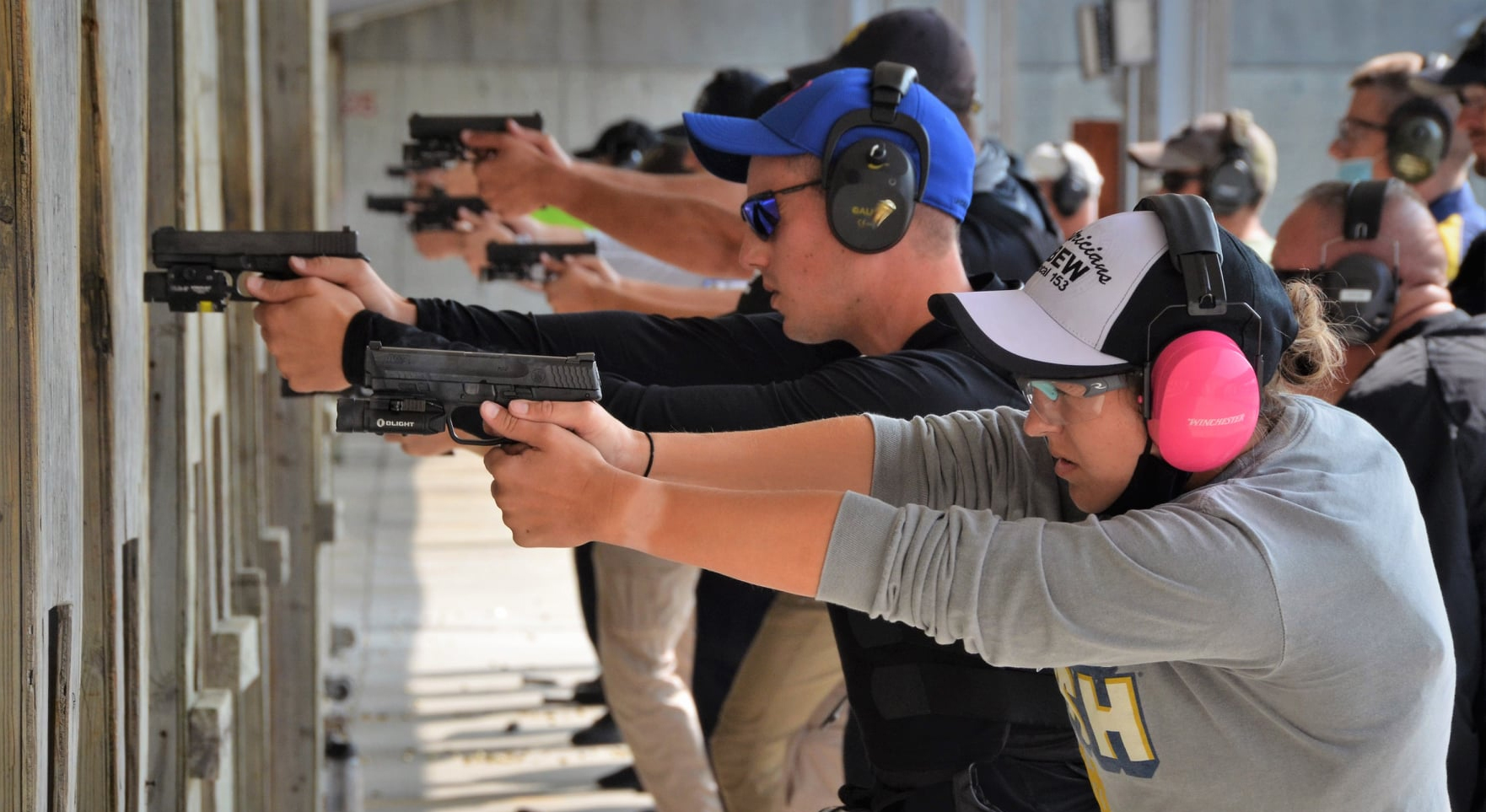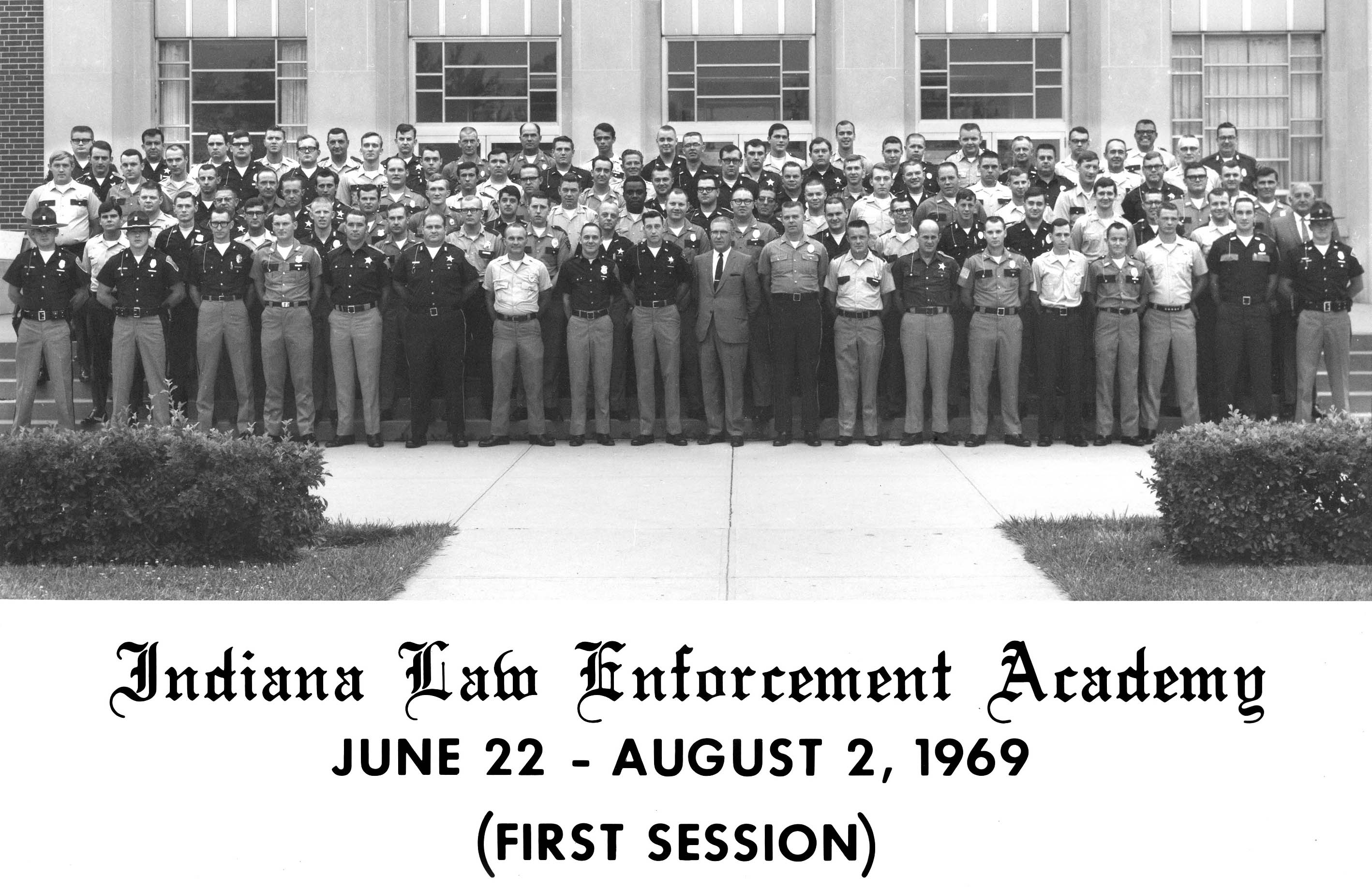
The Academy's Basic course for new police officers consists of over 600 hours of training in a variety of areas. Criminal and traffic law, firearms, emergency vehicle operations, physical tactics, EMS awareness and human behavior are some of the major areas of instruction during this course.
A variety of other police related subjects such as accident investigation, criminal investigation, domestic violence and sexual assault, water rescue training, Standardized Field Sobriety Test, crime prevention and drug and narcotics are included in the areas an officer must study before graduating.
The course of study is designed to incorporate practical as well as classroom exercises so the officers have a better idea of how they will react to situations they will encounter when they return to their departments.
Emergency Vehicle Operations Course

Through the development, understanding and applied knowledge of the vehicle, reading the roadway, driving skills and behaviors promoted during emergency vehicle operations, basic officers are able to successfully control the stress commonly associated with operating an emergency vehicle. They also learn vehicle handling and weight transfer techniques for high speed emergency response and pursuit driving.
All officers receive training in the proper use of tire deflation devices. Students are also trained in driving simulators, which places them in "virtual" situations that law enforcement officers might be faced with. The student must pass each segment of the driving instruction and a comprehensive written examination.
Physical Training

Basic police recruits upon reporting to the Academy must successfully complete a mandatory battery of physical fitness components. These components are the vertical jump, push-ups, sit-ups, 300 meter run and 1.5 mile run.
These same components, with higher standards, must be successfully completed at the end of the Basic Session as well. The students receive instruction in the area of physical education and fitness by certified staff and have access to some state-of-the-art equipment to help accomplish their fitness goals.
Firearms Training

Basic police recruits receive lecture and practical firearms instruction from veteran firearms instructors. Subject matter includes topics such as handgun safety and maintenance, fundamentals of shooting, malfunctions, shotgun and the force continuum.
Students must shoot a minimum qualifying score with their weapons and pass a comprehensive written examination.
Vehicle Crash Investigations

Basic police recruits receive lecture and practical vehicle crash training from veteran accident investigators. Students must demonstrate both practical and written proficiency in vehicle crash scenarios.
Aside from basic recruits, advanced vehicle crash investigation courses are offered to veteran officers.
Criminal Investigation Training

Basic police recruits receive lecture and practical instruction from veteran criminal investigators which includes interviews and statements, crime scene behavior, interrogations, first responder responsibilities and collection of evidence.
Students must demonstrate a practical proficiency in taking statements and conducting a criminal investigation involving a scenario.
Physical Tactics

Basic police recruits receive lecture and practical training in physical tactics from certified veteran physical tactics instructors.
This includes training in pressure points, joint locks, handcuffing, strikes/blocks/combinations, straight baton, ground fighting and weapon retention.
Students must demonstrate a proficiency in each of the areas and pass a comprehensive written examination.
Domestic Violence and Sexual Assault Program

The Academy has entered into a collaborative agreement with the Indiana Coalition Against Domestic Violence (ICADV) and the Indiana Coalition Against Sexual Assault (INCASA) to provide detailed domestic violence and sexual assault training. The program has been funded by a grant awarded to ICADV and INCASA.
Basic police recruits will receive eight hours of training involving victim and officer safety, safety planning, legal issues, impact of arrest, intervention and investigation, victim assistance, overview of sexual assault, police response to sexual assault and a discussion with a panel of domestic survivors.
History of the Basic Training Course

No basic training was available for most of the State's law enforcement officers until 1969.
A six-week basic training program began in August 1969, but attendance was voluntary and remained voluntary for nearly three years.
Basic training became mandatory July 6, 1972. All persons already sworn in and serving on a police department prior to that date were exempted ("grandfathered") from the training mandate as long as they maintained continuous/unbroken service with that department. If they left their department to go to another department, or left law enforcement and then returned, they lost their exemption.
All persons appointed as law enforcement officers on or after July 6, 1972 were/are mandated to complete basic training within one year of the date they are originally hired as a law enforcement officer. Failure to do so results in the loss of arrest powers. Extensions of the one-year time limit can be granted for military or other authorized leave of absence. In such cases an aggregate of time before and after the leave of absence shall be used to determine when law enforcement authority expires.
From July 6, 1972 until July 1, 1993 persons appointed as a law enforcement officer could work through their first year of employment with full law enforcement powers [but with absolutely no training] while waiting to be enrolled in - then successfully completing - basic training. Those who did not successfully complete basic training by their anniversary date of employment (the date they were originally hired) lost their arrest powers.
Legislators, prosecutors, judges, and the police themselves had a problem with people being given a gun and badge then being allowed to exercise police powers without any training whatsoever, albeit only for one year. So the law was amended to mandate that any person who was appointed as a police officer on or after July 1, 1993 had to complete a pre-basic course before being vested with police powers. This pre-basic course consists of a minimum of 40 hours of instruction and contains the fundamentals of criminal law, traffic law, and the use of force. It also requires a demonstration of proficiency with a handgun. Upon completion, the new hire is empowered to work the remainder of his or her first year of service with full police authority. But, if full law enforcement training is not complete by the anniversary date of the officer's initial hiring, arrest powers are lost and can only be regained by successfully completing basic training.
There are two law enforcement basic training programs that meet the mandatory basic training requirement. One is the Tier II Course, consisting of 400 hours of training at the Indiana Law Enforcement Academy and 40 hours of home study. Persons who successfully complete this training are only eligible for employment as police officers in towns having no more than one Marshal and two Deputy Marshals. If they subsequently change employment and go to a Municipal or Sheriff's Department they must complete a regular/full law enforcement basic training course.
The second training program, generally referred to as the [regular] basic training course or Tier I, is a minimum 600 hours in length. Basic courses are taught at six other sites around the state; however they are locale specific:
Indianapolis Metropolitan Police Department Academy
Fort Wayne Police Department Academy
Northwest Indiana Law Enforcement Academy
Southwest Indiana Law Enforcement Academy
Indiana University Police Academy
Indiana State Police
To view a video describing the ILEA's Tuition Student Program CLICK HERE.
